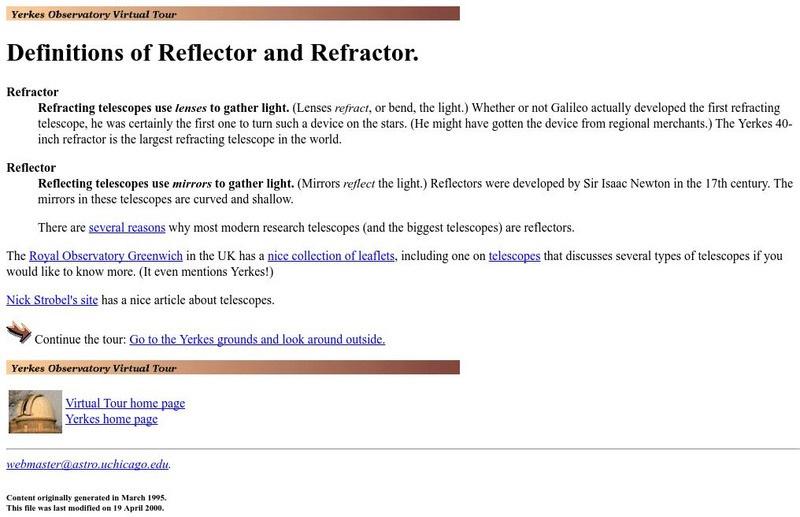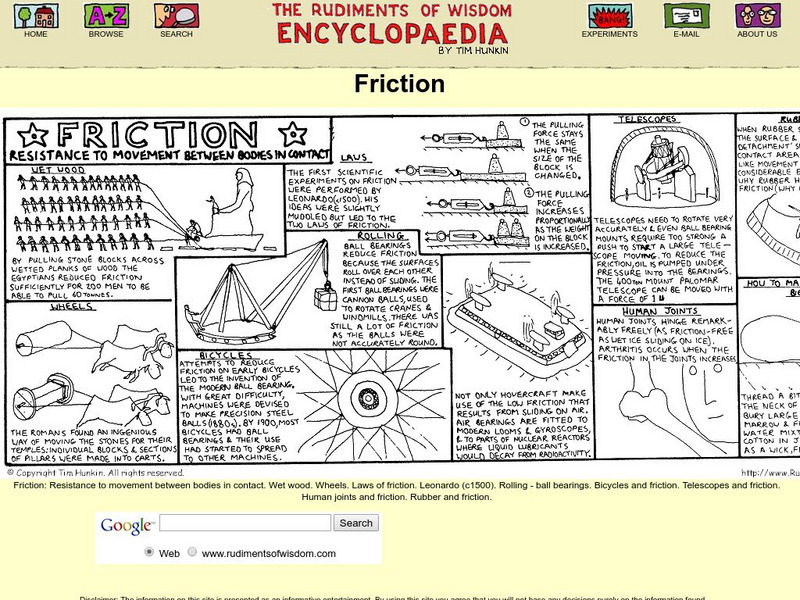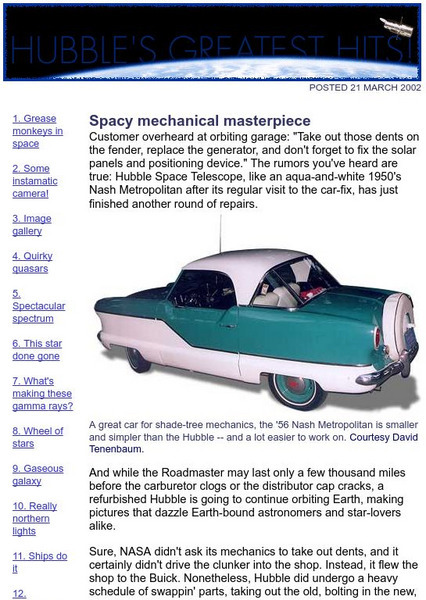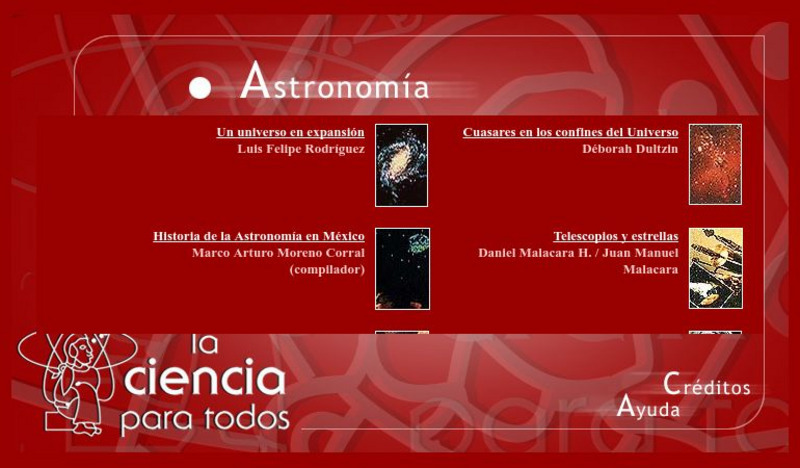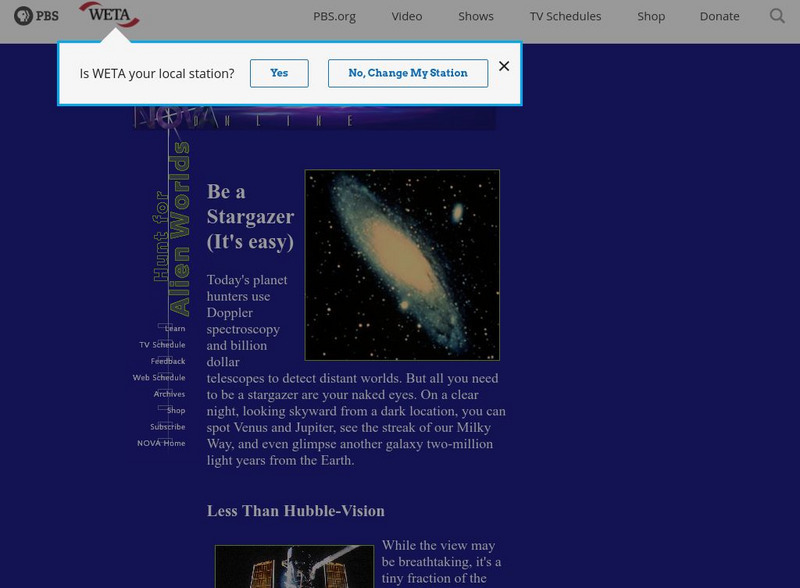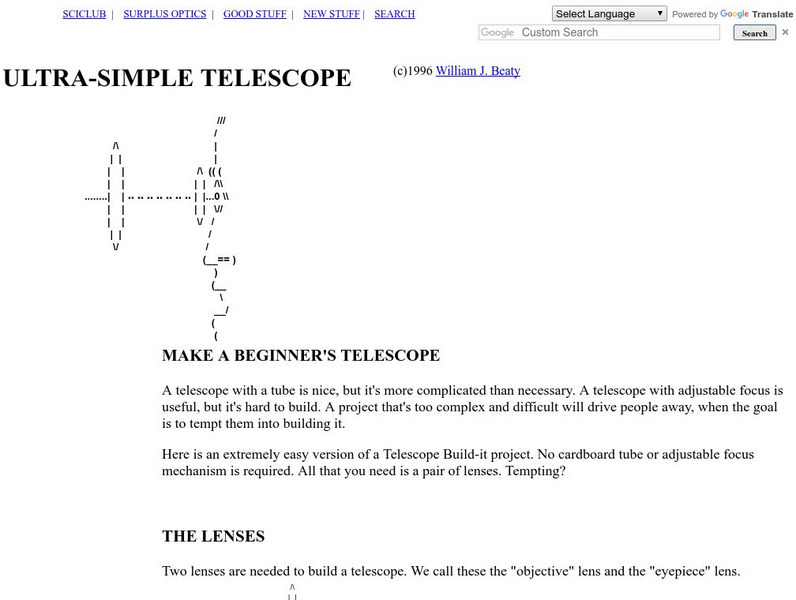University of Maryland
Optics Highlights: The Telescope
Part of an anecdotal history of optics and the study of light. Extremely thorough treatment of the invention of the telescope. Includes a short biographical sketch and discusses the work of Isaac Newton which focuses on his contribution...
CK-12 Foundation
Ck 12 Ex. Series: Simulations: How Does a Telescope Collect and Magnify Light?
[Free Registration/Login Required] A video and simulation designed to teach the effect of diameter, focal ratio, and the length of the eyepiece focal on a view through a telescope.
BBC
Bbc: Gcse Bitesize: Lenses
Lenses are precisely shaped pieces of glass that have been developed and used in corrective glasses, telescopes, microscopes, binoculars, and magnifying glasses. They can be convex or concave. Links are provided to a video an a test.
University of Chicago
University of Chicago: History of Yerkes Observatory
Read about the history of the Yerkes Observatory, which was run by the University of Chicago. This observatory houses one of the few research grade refractors in the world. The observatory was closed in October 2018 and discussions were...
CK-12 Foundation
Ck 12: First Grade Science: Telescopes
[Free Registration/Login may be required to access all resource tools.] Discusses how telescopes are constructed and how they are used to help see the night sky.
CK-12 Foundation
Ck 12: Earth Science: Telescopes Study Guide
[Free Registration/Login may be required to access all resource tools.] This study guide summarizes key points about electromagnetic radiation and the different types of telescopes that rely on various forms of it. Includes a few...
Harvard University
Harvard Univ.: Chandra X Ray Observatory Center
The Chandra Observatory uses x-ray telescopes to learn more about the make-up of the universe. To learn more about x-ray telescopes and to see what they reveal, click here for the official Chandra X-ray Observatory website.
CK-12 Foundation
Ck 12: First Grade Science
This customizable digital textbook covers topics related to first-grade science. It is Next Generation Science Standards (NGSS) aligned.
University of Chicago
University of Chicago: Reflector and Refractor
From the Yerkes Observatory Virtual Tour web site. Compares and contrasts reflecting and refracting telescopes. A link from the page leads to a second page which explains why most modern research telescopes are reflecting telescopes.
Rudiments of Wisdom
Rudiments of Wisdom: Friction
Check out this cartoon that shows various types of friction.
University of Wisconsin
The Why Files: Spacy Mechanical Masterpiece
An interesting article describing repairs which were completed on the Hubble telescope in 1993 and 1997. Also contains links to pictures taken by the telescope.
Instituto Latinoamericano de la Comunicacion Educativa
La Ciencia Para Todos: Astronomia
In this site you will find several Astronomy topics such as: the expansion of the Universe, history of Astronomy in Mexico, quasars in the confine of the Universe and telescopes and stars.Read phonetically
PBS
Pbs: Nova Online: Be a Stargazer
This resource briefly describes how telescopes work and provides helpful tips for stargazing.
Ducksters
Ducksters: Physics for Kids: Telescopes
Kids learn about telescopes in the science of physics including lenses, mirrors, refracting, reflecting, the history, and the Hubble Space Telescope.
ClassFlow
Class Flow: Telescope a Scientists Tool
[Free Registration/Login Required] This flipchart is designed to teach and extend the concept that telescopes are tools for scientists to study distant objects. Included in this flipchart are websites and an Activote assessment.
Other
Science Hobbyist: Making Telescopes
Site describes how to construct a telescope and what you can do with it. Also provides a simple explanation of how telescopes work.
The Tech Interactive
Tech Museum of Innovation: Eye on the Universe: The Hubble Space Telescope
This site provides information about the Hubble Space Telescope, and its mission into space.
Science4Fun
Science4 Fun: Telescope
Illustrated discussion of the invention of the telescope with details on Galileo's telescope, the reflecting telescope, and the space telescope.





